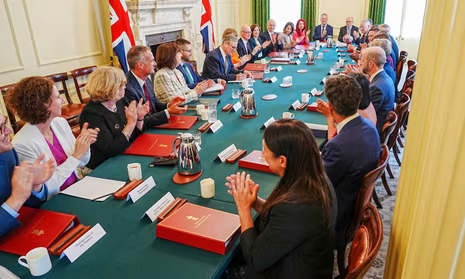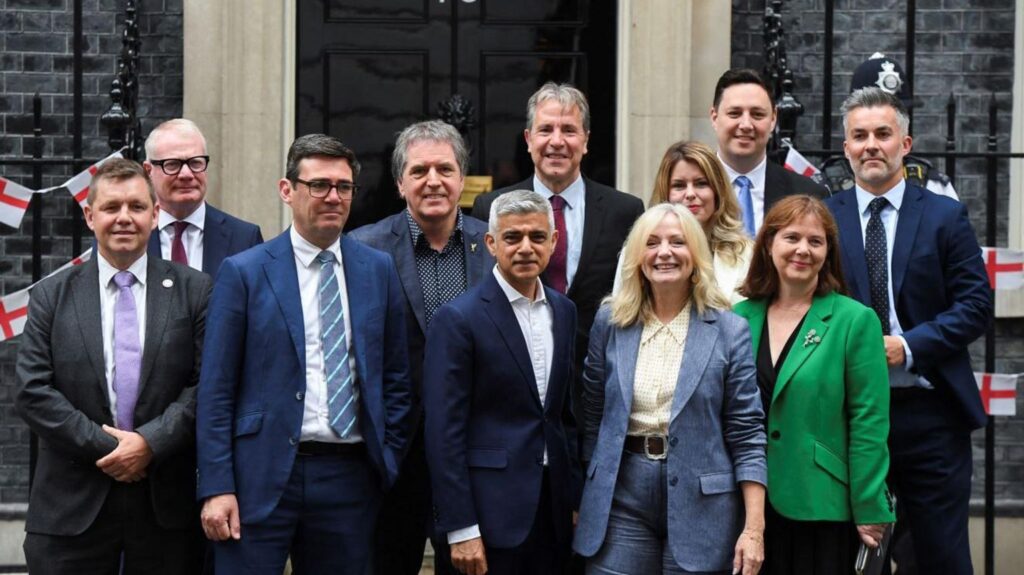Change Begins: What could the new UK Government mean for business.
As we start the first full week of the UK’s new Labour run government, we thought we would take a look at what the change in government could mean for businesses. We have looked through the party’s election manifesto, policy documents and listened to what key members of the party have said in the run up to the election to get an idea of what could be to come….

“We are at a post-Brexit crossroads. We can continue down the road of managed decline, falling behind our competitors, or we can draw on bold thinking to propel us forward. We can cling to the old ways; or we can apply ourselves with creativity, determination and common sense to shaping our future outside the European Union, while improving our trading relationships, including with our nearest neighbours.
That calls for fresh thinking about regulation and planning, access to finance and strategic partnership with industry, so that we lead the way. That is why I am so pleased to welcome this radical plan to make Britain the high growth, start-up hub of the world.”
– Rachel Reeves, Chancellor of the Exchequer
Business Taxes
– Corporation Tax: Labour have committing to capping Corporation Tax to the current 25% mark for the entire term of this government and have said that they would act to change this only if there was a risk caused by tax changes in other countries affecting ‘British competitiveness’ (with reference to the Corporate Tax rate being the lowest across the G7 countries). So, perhaps a cut could be on the cards if any competitive markets look to cut their rate.
– Business Rates: Furthermore, it appears that we are finally going to get some much needed reform to business rates which have been considered as outdated and harmful on all sides for a number of years. The replacement would be designed to raise the same amount of revenue but in a fairer way with this likely being a higher digital service tax that asks larger online retailers to pay more whilst small, independent bricks & mortar high street stores pay far less (if anything) to encourage investment and growth in our high streets. This would be hugely welcomed by small businesses with physical stores who are currently under immense pressure through recent cost-inflation and cost of living.
– HMRC: Labour has also said that it would provide additional funding to HMRC to clamp down on tax avoidance and none payment of taxes with a target of chasing down an extra £6 billion annually that the National Audit Office has said could be recovered.
– R&D Tax Credits: The importance of R&D tax credits has been noted by Labour as well as some of the complexities and challenges in applying for relief. Whilst no particular plans have been outlined it is expected that R&D tax credits will remain.
– Income Tax: The new government has said that it will stay committed to the previous government’s plan to keep the income tax allowance at the current levels till 2028. This will come as disappointment to many of those who have pushed for an increase in this allowance, especially after the pressure caused by the recent spikes in inflation.
It has been stated that VAT & National Insurance will be left alone and remain at the current rates in order to give consistency and stop a recent trend of regular changes in tax levels. Furthermore, Labour have said that they will look to have only ‘one major fiscal event’ a year and give businesses advance notice of policy to allow them to plan accordingly. A full business tax roadmap has been promised which should give an indication of any other potential changes over the next few years.
Industrial Strategy, Devolution & Business Support
Labour had announced the creation of a new industrial strategy for the country. An industrial strategy aims to pull together various economic policies together in order to drive growth. The last time the UK had such a strategy was in 2017 under the Theresa May Government. Likewise, regional industrial strategies had been a feature of several of the manifestos of Labour candidates for the regional Mayor elections back in May – such as Richard Parker the recently elected Mayor of the West Midlands Combined Authority. Furthermore, the current drive towards greater devolution will be continued by the new government with all the regional Mayors already having met with the Prime Minister & Deputy PM at Downing Street to discuss a major new package of devolution and for the PM to ask them to get to work on putting together plans for growth in their respective regions.
What could happen here is a national Industrial Strategy which is fed in by the regional strategies (including those for the devolved nations) which creates an opportunity for joined up thinking and complementary decision making at the right levels. Combined with the opportunity for greater spending decision making powers at a local level, could this be a catalyst for the ‘levelling-up’ many regions have been waiting for (we’ll call this Levelling-Up 2.0). It is expected that AI and other emerging technologies will be a central theme of the Industrial Strategy with former PM Tony Blair urging the new government to focus on making the UK a world leader in these technologies to power growth.
However, the phrase Levelling-up is currently being ‘tippex’ out of use with the Department for Levelling Up, Housing and Communities now reverting to its previous name of the Ministry of Housing, Communities and Local Government so we don’t think the new government will take up this name!
What they will need to do is get a grip of the current situation around UK Shared Prosperity Funding (UKSPF) which was the UK’s replacement to previous European funding streams which provided funds for business support, innovation, infrastructure, culture and more. Current funds end in March 2025 and although many have speculated that the short term solution will be a 1 year extension to this funding, lessons need to be learned on how UKSPF has delivered so poorly. In particular for businesses, essential business support services receive core funding through the UKSPF mechanism so clarity is needed quickly.
Potentially, there is hope for a long-term funding solution, something that the National Enterprise Network which BEC is a proud member of has been advocating for a long time. Labour have already announced long-term, 10 year funding cycles for R&D institutions to break similar issues those organisations were facing with funding so could we see them follow this pathway here. We suspect that answers will come for this in the next round of devolution deals.

Funding & Investment
Labour have promised to create a new National Wealth Fund with a string of funding allocations promised including:
- £1.8 billion to upgrade ports and build supply chains across the UK
- £1.5 billion to new gigafactories so our automotive industry leads the world
- £2.5 billion to rebuild our steel industry
- £1 billion to accelerate the deployment of carbon capture
- £500 million to support the manufacturing of green hydrogen.
The focus of this National Wealth Fund is to drive greater levels of private investment by allowing the government to put money on the table to match fund capital provided by private players.
In a continuation from work conducted by the previous government, there are also pension reforms promised that will help unlock more pension funds for investment which could both put more funds on the table for business investment and drive better outcomes through diversification for pensions.
Reform is also on the cards for the British Business Bank (BBB) in a bid to create better access to finance for businesses in the UK. No details are given in the manifesto, however, there were several policy recommendations for BBB reform in the ‘Start-Up, Scale-Up: Making Britain the best place to start and grow a business’ paper put together for the Labour Party which could give a strong indication of the type of change expected. Interestingly, the paper also gives some suggestions for improvements to both the SEIS & EIS tax incentive schemes for equity investment which could also be reviewed and considered.
The new government has also made commitments to provide investment for significant infrastructure investment into roads, rail, gigafactories and, importantly, digital infrastructure such as greater 5G network development.
People & Skills
The new government has made this one of their major focus areas with a drive to tackle skill shortages and levels of economic inactivity. First up is a merger of the Job Centre & National Careers Service to create a fit for purpose national support structure to help people into work.
It’s unlikely there will be major changes to skills funding initially, with the focus on making adaptations to current provisions and pots to help more into work. In particular the new government will focus on getting the 1 in 8 18-21 year olds who are neither working or in education to get into work through their new ‘Youth Guarantee’ to drive better skills training for these individuals and help with work experience too.
Talks of greater alignment between policies and work on skills & employment and health & social have also been highlighted to provide greater support to those who face barriers to employment such as those with disabilities or those experiencing mental health challenges.
FInally, Labour have talked about ‘making work pay’, ensuring that people are genuinely better off by working, which is not always the case at the moment. This will include some changes to welfare and benefits but most of this focus will be on big changes to employment laws. What should you expect? It is very likely that we will see rises in the living wage, removal of age tiers for minimum wage for adults, increased employee rights from day 1 of employment, and a ban on zero hours contracts.
Small Business & Self-employed
Although Labour have made clear that they value the contribution of small businesses and the self-employed, there is more detail needed on exactly how they will support these vital contributors to the economy. There is reference to continuation of ongoing work on tackling late payments, banking hubs and better access to public sector contracts but not much else at the moment.
We would take this opportunity to highlight the great work that the National Enterprise Network has done to put together policy recommendations that would provide impactful support to SMEs, micro businesses & the self-employed and will look to join with our fellow members to campaign for these recommendations. You can read more about what the NEN has proposed here.



